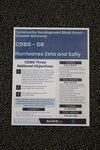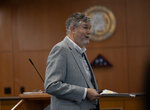In response to the impacts of Hurricanes Sally and Zeta in 2020, a state agency has awarded a subgrant to Baldwin County, and the county is currently seeking a vendor to conduct assessments of areas …
This item is available in full to subscribers.
Please log in to continue |


In response to the impacts of Hurricanes Sally and Zeta in 2020, a state agency has awarded a subgrant to Baldwin County, and the county is currently seeking a vendor to conduct assessments of areas requiring recovery.
In a bid to address the aftermath of the impacts of the storms, which caused widespread power outages and damages across Baldwin County, the Disaster Relief Supplemental Appropriations Act was passed by the U.S. Congress in 2021.
This act allocated $27 billion in emergency funds to address the aftermath of recent natural disasters and extreme weather events. This funding aimed to aid families, small businesses and entire communities in their recovery efforts. Additionally, $1 billion was designated for enhanced investments in scientific and environmental research, while $10 billion was allocated for various nondefense programs.
Alabama received $501 million for long-term recovery, with the Alabama Department of Economic and Community Affairs designated to administer the Community Development Block Grant Disaster Recovery Award.
As part of the recovery plan, ADECA awarded a subgrant to Baldwin County in 2023. The initial federal allocation of $1 million was intended to support planning activities, with a local recovery plan expected to be delivered by September.
Baldwin County is set to receive an additional $43,361,686 to implement recovery activities, with the period of performance ending on May 31, 2026. Of this amount, $19 million will be allocated for housing initiatives, while $24 million will be dedicated to non-housing projects.
On Feb. 15, the Baldwin County Commission hosted a public meeting with municipal and tribal representatives to introduce the CDBG-DR.
Grants Director Brian Underwood said this project will not only benefit certain areas of Baldwin County, but the entire county.
"It is going to provide funding for long term recovery from those two storm events, Sally and Zeta, in the areas of housing, public infrastructure and economic revitalization," Underwood said. "We ran a request for proposals that was publicly noticed, and we received proposals from a large number of vendors. Those have been scored and received by a committee here at the county and we have developed a short list of four vendors who are continuing to discuss the project with and we expect to recommend moving into a contract with one or more of those shortlist vendors."
According to Underwood, funding will go toward what is called a vulnerable population. This is part of a protected class, underserved, historically disadvantaged and economically distressed area.
To ensure the eligibility of recovery activities and projects, three specific criteria have been established. First, the activities must address direct or indirect disaster-related impacts. Additionally, they must align with the requirements of the CDBG-Eligible Recovery Activity, as outlined in the Housing and Community Development Act of 1974. Lastly, the activities must meet one of three national objectives: benefiting low and moderate-income individuals or areas, aiding in the prevention or elimination of slums or blight, or addressing an urgent need based on the scale of severity of risk.
For the recovery project to be comprehensive and inclusive, stakeholders are encouraged to take part in discussions.
"Per the HUD guidelines, we are obligated to engage equitability with communities, residents, businesses, nonprofits, nongovernmental organizations, advocates, faith-based organizations, et cetera, to help us determine the need within the county," Underwood said.
As the recovery plan progresses, collaboration among stakeholders is crucial in ensuring a comprehensive and inclusive recovery plan. To stay informed and involved, stakeholders are encouraged to monitor public notices.
The selection of a company to facilitate the recovery process will be subject to public comment.